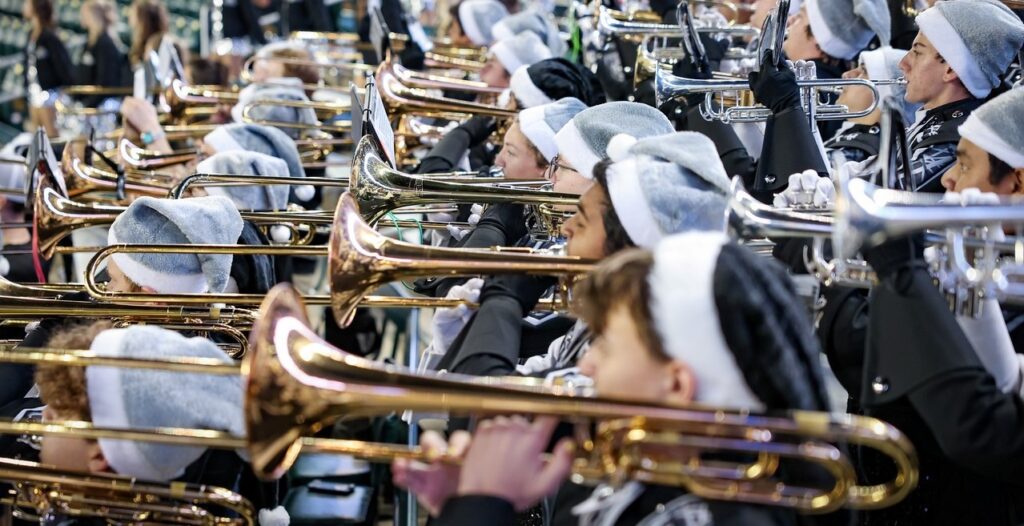20 Ways to Set the Tempo for a Great School Year
Remember these quick practical tips, foundational ideas, insights and philosophies to remind you why you chose teaching music as your career.
When you’ve been in the trenches, such as teaching in urban classrooms or underfunded rural programs, you pick up a thing or two about education, and more specifically, the art of teaching music. One of the first things you learn is that this isn’t a one-person show. So, accept help and advice whenever you can — mentors and colleagues, from you own experiences and through trial and error (the hardest way).
I’m sharing these foundational ideas, insights, practical tips and philosophies because they have guided me through a journey of highs, lows and everything in between. While you will develop your own style, there are some common things that every educator, regardless of their instrument or discipline, can incorporate into their lessons. That’s what I tried to focus on here.
My main concern is that the list below captures only what I remember — I know that there is so much more that I have forgotten!
1. Things Just Take Time
 You can’t rush the good stuff. Whether you’re waiting for the ensemble to gel or for that one kid to finally get it — patience is key. Many of my mentors echoed this sentiment. And trust me, those seeds you’re planting? They will grow. You just have to give them time.
You can’t rush the good stuff. Whether you’re waiting for the ensemble to gel or for that one kid to finally get it — patience is key. Many of my mentors echoed this sentiment. And trust me, those seeds you’re planting? They will grow. You just have to give them time.
Time is like a good brass polish — it reveals the shine that’s always been there. The virtue of patience can be especially hard when you’re bursting with energy and vision. Always remember that every note played and every mistake corrected accumulate into something extraordinary over time. Patience is not passive; it’s a strategic investment.
2. An Ensemble Is a Direct Reflection of its Conductor
This was the first bit of advice I received from my high school band director, Mr. Ted Lega. He received it from his mentor, Dr. Harry Begian, director of bands at the University of Illinois from 1970-1984. So, I guess you could say it’s “grand” advice that’s been handed down from generation to generation.
If your group sounds disjointed, it might be time to look in the mirror. Just as a composer leaves an imprint on every composition, your energy, mood and skills are mirrored by your ensemble. Your approach sets the stage for either harmony or discord.
THE YAMAHA EDUCATOR NEWSLETTER: Sign up to receive real-world advice, tips and instrument guides!
3. There’s Always Money Somewhere
 This was a quote that my college band director, Dr. Charles Menghini, said in passing that I’ve never forgotten. “Sometimes the money’s not in the budget, but that doesn’t mean it’s not out there.”
This was a quote that my college band director, Dr. Charles Menghini, said in passing that I’ve never forgotten. “Sometimes the money’s not in the budget, but that doesn’t mean it’s not out there.”
Here’s something that you learn when working with budgets that could make a shoestring look generous — there’s always money somewhere. Sometimes, you have to get a bit creative to find it. In my years of teaching, I’ve witnessed remarkable things happen through grants, community donations and good old-fashioned spaghetti dinners. Read my article on “Financial Tips for Music Educators.”
4. Kids Love Being in on the Process
 Give your students some skin in the game by letting them help select pieces or lead warm-ups. When I started incorporating student input, the atmosphere shifted from “us vs. them” to “we’re in this together.” And the best part was that performances were better for it. Besides, I’m the only director at my school, and I need the help!
Give your students some skin in the game by letting them help select pieces or lead warm-ups. When I started incorporating student input, the atmosphere shifted from “us vs. them” to “we’re in this together.” And the best part was that performances were better for it. Besides, I’m the only director at my school, and I need the help!
5. Multitasking Can Be Disrespectful
This was a hard lesson for me. You think you’re being efficient, but you’re actually sending a message that what’s happening in front of you isn’t worth your full attention. In a digital age, this is even truer.
There’s nothing like looking out into a sea of smartphone screens to make you question your life choices. Your full attention signals to your students that they’re worth it, something I wish I’d grasped earlier in my career.
6. The Brain Is for Creating
Organization is key. Clipboards, sticky notes, digital apps — whatever helps you keep your tasks in check, use it. There’s freedom in structure that liberates you to be more inventive and responsive in your teaching. I’ve always been a pen-and-paper kind of guy, jotting down notes, to-dos and observations. Free up mental space for what your brain does best: creating and solving problems. Thinking all the time gets pretty tiring!
7. Literature Selection Matters
 What you choose to play shapes not just the musical experience for your students, but also their emotional and intellectual development. What we play may be the most important curricular decision we make. And sometimes it’s also OK to program things that the kids like! Keep an ear out for what your kids warm-up on before rehearsal begins, and you instantly will know what works.
What you choose to play shapes not just the musical experience for your students, but also their emotional and intellectual development. What we play may be the most important curricular decision we make. And sometimes it’s also OK to program things that the kids like! Keep an ear out for what your kids warm-up on before rehearsal begins, and you instantly will know what works.
8. Music Theory Matters
You can’t fix a flat note if you don’t understand why it’s flat. When you and your students understand the mechanics of music, you are armed with the tools to refine, adjust and excel. I’ve had the privilege of learning from some of the most theoretically sound minds in the field, and the knowledge has been invaluable.
9. Teaching Just Feels Good
There’s not much that can compare to the look on a kid’s face when they nail that tough passage for the first time. The joy of teaching is its own reward, and it’s what keeps me coming back year after year. When you see that aha moment in a student, it’s like hitting the jackpot. I’ve been lucky to experience this thrill many times, and let me tell you, it never gets old.
10. Act Like You Belong
Sure, some days the music stands are missing, the tuba has a dent and the second clarinets are revolting — figuratively, of course. Even on those days, especially on those days, you must put on your game face. You chose this path for a reason, so find ways to remind yourself on why you do what you do.
11. The Complain-Twice Rule is in Effect 24/7
 This is an original: Complain about something twice, and you either need to fix it or let it go. It’s a principle that has served me well and has kept the rehearsal room positive and proactive.
This is an original: Complain about something twice, and you either need to fix it or let it go. It’s a principle that has served me well and has kept the rehearsal room positive and proactive.
Moral of the story: Either change it or change your attitude about it. Students are like sponges; they’ll soak up the positive vibes or the griping, so choose carefully. Being able to focus on solutions rather than problems is a skill I’ve honed over time, but it does it make a difference.
12. The Cost of Saying “Yes”
Remember that your time and energy are finite resources. When you commit to something, make sure it aligns with your goals for the ensemble and yourself. Sometimes turning down a side gig or additional responsibility is the best thing you can do for your students. In more practical approaches, saying yes to one student may mean saying no to everyone else.
13. Caring Comes in Many Forms
Whether it’s tough love or a listening ear, caring isn’t one-size-fits-all. Some days it’s a high-five, other days it’s a hard conversation about missed notes or missed opportunities. Your students are as diverse as the instruments they play, and they require different forms of caring. This is a teaching philosophy I’ve developed over the years, and it’s one that serves me well.
14. The Weight of “Should”
 I catch myself with this one. If you’re using the word “should” too much, you’re not in the moment, and that’s a problem. Or, you have not accepted either what your situation is or where your control may be. I learned early on to adapt, reassess and keep it moving. “We shouldn’t have to invite the principal to our concert — they should just attend!” This, and other items, are not always how things work.
I catch myself with this one. If you’re using the word “should” too much, you’re not in the moment, and that’s a problem. Or, you have not accepted either what your situation is or where your control may be. I learned early on to adapt, reassess and keep it moving. “We shouldn’t have to invite the principal to our concert — they should just attend!” This, and other items, are not always how things work.
15. We Are Never 100% Without Control
It’s easy to feel swamped, but one of the most empowering lessons I’ve learned is that there’s always something you can control. Whether it’s your reaction, your mindset or your next move, seize it. No matter how chaotic things get, remember that you’re never without options. I’ve faced numerous challenges that seemed insurmountable at the time, but there’s always a lever to pull, always a button to push.
16. Self-Judgment vs. Other-Judgment
It’s easy to hold yourself to one standard and your students to another. This disparity is something I’ve worked hard to reconcile over the years, aiming for a more equitable view that fosters mutual respect and understanding. Kids respond positively to teachers who walk the walk.
17. The Ultimate Conformists’ Activity
My former colleague Dan Moore, a retired music educator and author of “Important Ingredients” method book, often spoke about band being the ultimate conformists’ activity. Yes, the individual is important, but continuing to promote collective success helps our students understand that we can’t do this alone. I’m not always one who enjoyed group projects, but there was something special about performance music and the way it showcases the individual, the smaller sections and the larger group. Each member has a role to play, and it’s rewarding for everyone when all these roles align.
18. Insistence, Consistence, Persistence
Another invaluable piece of advice from Mr. Lega and Dr. Harry Begian: A great program has a director that is insistent, consistent and persistent. If I had to sum up my teaching philosophy, it would be these three words. They serve as the foundation upon which I try to build a fulfilling and impactful career.
19. Every Day Is a Reset
 Good or bad, tomorrow is another chance. Each new day presents a clean slate to try again, to be better, to make music. Embrace it.
Good or bad, tomorrow is another chance. Each new day presents a clean slate to try again, to be better, to make music. Embrace it.
20. I’m Just Happy to Be Here
I have a Post-it note near my desk that says, “You’re in your dream job. Act like it.”
I often pause to remember my early ambitions and appreciate the journey that has led me to where I am today. Whenever I find myself in a tough situation, I remind myself of this simple truth: There was a time when all I wanted was exactly what I have now.
Over the years, mentors, colleagues and above all, experiences, have contributed to these insights. Take these lessons as you will, tweak them to fit your own style, but always remember that teaching is a balancing act. You’re not just sharing information; you’re influencing the next generation. Sure, there are challenges — budget constraints, restless students, administrative tasks — but keep your eye on the bigger picture. Collect wisdom from others, be consistent in your approach and make room for growth. Every day offers a fresh start. Just take it one step at a time and remember: You’re making a difference!















